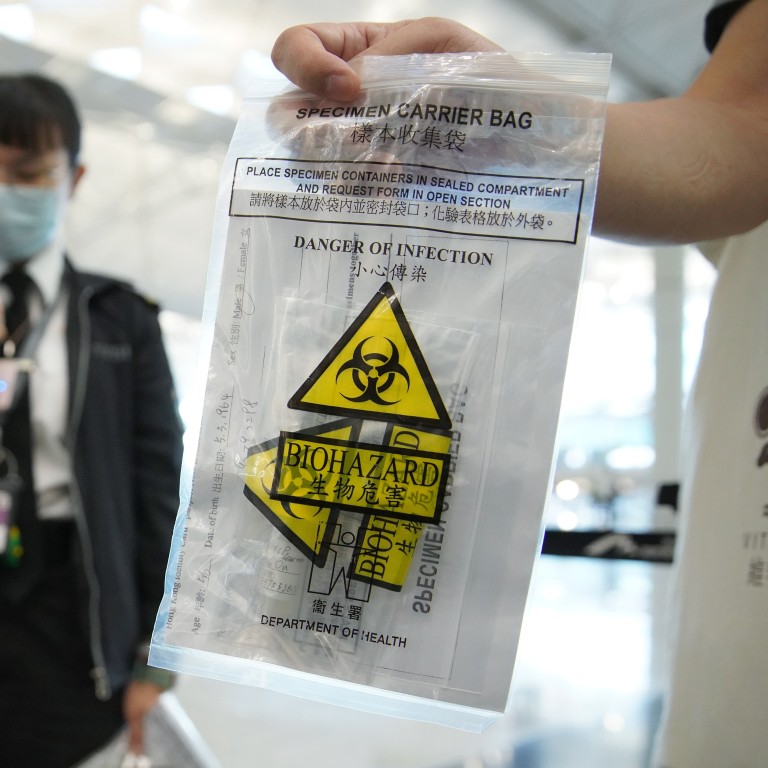
Exclusive | Prenetics buys Oxsed RaViD’s rapid coronavirus diagnostics technology to slash screening time to a fraction of current tests
- Oxsed RaViD throat and nose swabs reportedly deliver accurate test results within 15 to 30 minutes and are already in use at London’s Heathrow airport
- That test is much faster than current PCR tests at Hong Kong’s airport, which require travellers to wait up to eight hours, or even overnight, for results
Prenetics said it had bought exclusive rights to technology that can cut the diagnostics time for Covid-19 tests to a fraction of the time of RT-PCR tests used at Hong Kong’s airport, in an acquisition that could make cross-border travel safer and speed the creation of travel bubbles.
The Hong Kong-based start-up has acquired the Oxsed RaViD test technology developed by University of Oxford scientists to screen for Covid-19 infections, according to Danny Yeung, co-founder and chief executive of Prenetics.
“This is a game-changer, and we aim to make the technology available to millions of people globally,” Yeung said, declining to provide financial details of the acquisition.

The acquisition comes ahead of the world’s first so-called travel bubble in November, where passengers who test negative for the coronavirus are allowed to travel between Hong Kong and Singapore without having to undergo quarantines when they arrive. Hong Kong’s government is seeking to create similar travel bubbles with 10 other destinations: Australia, France, Germany, Japan, Malaysia, New Zealand, South Korea, Switzerland, Thailand and Vietnam.
The travel bubbles are a welcome relief for global economies – especially cities with small populations like Singapore and Hong Kong – that rely on incoming business travellers and tourists to contribute to local consumption and sustain companies from hotels to restaurants.
Hong Kong’s tour agents estimate at least 6,000 jobs to be lost in the coming months if the city’s border is not reopened soon.
Hong Kong’s tourist arrivals plunged 92.4 per cent to 3.55 million in the first nine months from the same period last year. Almost 400,000 travellers from Hong Kong entered Singapore in 2018.
Prenetics, founded in 2007, uses a Covid-19 test that works on reverse transcription polymerase chain reaction, or RT-PCR. The Oxford team developed a viral RNA molecular test using a one-step nucleic acid amplification called RT-LAMP, which can yield accurate results within 15 to 30 minutes.
The reaction takes place in a tube heated to 65 degrees Celsius for 30 minutes, followed by results based on a colour change or by a fluorescence reader.
Singapore firm invents ultra-fast coronavirus breathalyser test
Oxsed, led by the professors Cui Zhanfeng and Huang Wei, was spun off in July from the University of Oxford. The company’s test kits would cost no more than £20 each, cheaper than most test kits widely available, Oxsed said in July.
Passengers were paying £80 (US$104) for the test in Heathrow as of mid-October. Cui and his protege Yu Yejiong did not respond to e-mails and phone calls for comment.
“We are excited to see Prenetics, a home-grown startup be in the fore-front in the global fight against the pandemic,” said Alfred Sit-Wing-Hang, Hong Kong’s secretary for innovation and technology.

Prenetics is part of a global network of governments and companies collaborating to reopen borders safely, seeking to ramp up testing in airports to boost travellers’ confidence, kick-starting trade and tourism.
The company, which claims to have performed more than 300,000 RT-PCR tests in Hong Kong and the UK, is working with the city’s government in providing mass community testing.
Prenetics helped to restart the English Premier League season by testing players in 20 football clubs, as well as introducing a so-called digital health passport in sports stadiums to screen for Covid-19 carriers.
Its key partner is the Commons Project, a Switzerland-based non-profit organisation backed by the Rockefeller Foundation, that is working to bring together governments from Rwanda to Colombia to tackle the coronavirus. The Commons Project is promoting a digital health passport for travellers to document they are Covid-19 test results.

Cathay Pacific Airways and United Airlines are testing the digital health passport on flights between London, New York, Hong Kong and Singapore. The scheme is set to be rolled out across additional routes in Asia, Africa, the Americas, Europe and the Middle East in quick succession, the Commons Project said earlier this month.
“Rapid, accurate, and frequent testing is one of our most important interventions to prevent large outbreaks and for the global economy,” Yeung said. “It’s our quest to help everyone in the new “normalcy” and open borders for travel, schools, sports, events, elderly care homes and more.”
No quarantine for Hongkongers returning from mainland, Carrie Lam says
As part of their deal with Prenetics, Oxsed’s scientists will continue to focus on making the tests available in low- and middle-income countries. Oxsed has designed the test to be used in the field without specialist equipment or training.
Simple, on-site testing is a must in African countries where the test is likely to be deployed less to boost travel and tourism, and more to ensure schools and shops are safe environments.
“This collaboration will enable fast global deployment of the Oxford Rapid Test, huge increase in production scale and potentially significant reduction in cost, which ultimately benefit the low- and middle-income countries in the world” said Adam Workman, head of Investments & New Ventures at Oxford University Innovation.

